
INDIAN JOURNAL OF MICROBIOLOGY
Scope & Guideline
Empowering Discoveries in Microbial Science
Introduction
Aims and Scopes
- Microbial Pathogenesis and Resistance Mechanisms:
The journal extensively explores the mechanisms by which pathogens cause diseases and how they develop resistance to antimicrobial agents. This includes studies on specific pathogens, resistance gene characterization, and the impact of antibiotic use on microbial communities. - Environmental Microbiology and Bioremediation:
Research focusing on the role of microorganisms in bioremediation processes, including the degradation of pollutants and the restoration of contaminated environments. This area emphasizes sustainability and the use of microbial applications for environmental health. - Biotechnological Innovations and Applications:
The journal promotes studies on biotechnological applications of microorganisms, including the development of biosensors, probiotics, and bioactive compounds derived from microbial sources for healthcare and agricultural use. - Microbial Diversity and Community Structure:
Research that investigates the diversity of microbial communities in various environments, including clinical, agricultural, and ecological contexts. This includes metagenomic studies and analyses of microbial interactions. - Food Microbiology and Safety:
The journal encompasses research on the microbiological aspects of food safety, including pathogen detection, antimicrobial properties of food-derived compounds, and the role of probiotics in enhancing food quality.
Trending and Emerging
- Nanotechnology in Microbiology:
There is a growing emphasis on the use of nanotechnology for antimicrobial applications and biosensing. Research involving nanomaterials, such as silver and zinc oxide nanoparticles, is increasingly prominent for their potential in combating resistant pathogens. - Microbiome Research:
Studies focusing on the human microbiome, particularly its role in health and disease, are rapidly gaining attention. This includes investigations into gut microbiota and its implications for conditions such as obesity, cancer, and mental health. - Probiotics and Gut Health:
Research on probiotics, especially their therapeutic potential in modulating gut health and their role in disease prevention, is becoming more prevalent. This reflects a wider interest in the health benefits of microbial interventions. - Antimicrobial Resistance and Surveillance:
As antibiotic resistance remains a critical global health issue, research monitoring resistance patterns and exploring novel strategies to combat resistant infections is increasingly featured in the journal. - Environmental Sustainability and Microbial Solutions:
Research highlighting the role of microbes in sustainable practices, such as bioremediation and waste management, is trending. This reflects a growing concern for environmental health and the need for sustainable agricultural practices.
Declining or Waning
- Classical Microbiological Techniques:
There has been a noticeable decline in studies employing traditional microbiological techniques in favor of molecular and genomic approaches. This reflects a broader trend towards more sophisticated methodologies that provide deeper insights into microbial functions. - Antibiotic Development and Discovery:
With the rise of antimicrobial resistance, the focus on traditional antibiotic discovery has waned as researchers pivot towards alternative strategies, such as phage therapy and non-antibiotic-based treatments. - Veterinary Microbiology:
Research specifically targeting veterinary microbiology appears to be diminishing. While still relevant, studies in this area are becoming less frequent as the journal's focus shifts more towards human health and environmental applications. - Plant Microbiology:
Although still a crucial area, research specifically related to plant-associated microbes and their interactions has decreased, possibly due to an increased emphasis on broader ecological studies involving multiple microorganisms.
Similar Journals
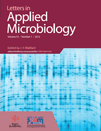
LETTERS IN APPLIED MICROBIOLOGY
Catalyzing Change in Applied Microbiology ResearchLETTERS IN APPLIED MICROBIOLOGY, published by OXFORD UNIVERSITY PRESS, is a prominent journal in the field of applied microbiology, serving as an essential platform for researchers and professionals to disseminate innovative findings. With an ISSN of 0266-8254 and an E-ISSN of 1472-765X, this peer-reviewed journal has been contributing to the scientific community since 1985 and continues to engage with cutting-edge research through 2024. With its current Scopus ranking placing it in the 45th percentile of its category, specifically at rank #70 out of 127 in the Applied Microbiology and Biotechnology field, it underscores its significance in advancing knowledge and applications pertinent to microbial science. Although it is not open access, LETTERS IN APPLIED MICROBIOLOGY offers comprehensive insights aimed at enhancing the understanding of microbiological phenomena in practical scenarios, making it a valuable resource for both seasoned experts and emerging scholars.
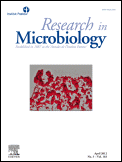
RESEARCH IN MICROBIOLOGY
Exploring the intricate world of microbes and their impact.Research in Microbiology, published by Elsevier, is a prominent academic journal devoted to advancing the field of microbiology, encompassing a diverse array of topics including immunology, molecular biology, and biochemistry. Established in 1987, the journal has expanded its focus over the years, with a commendable impact factor reflecting its relevance and influence in the scientific community. Although it does not currently offer open access options, Research in Microbiology remains a crucial resource for researchers and professionals seeking to stay abreast of the latest findings and methodologies. The journal holds a respectable Q2 ranking in Medicine (miscellaneous) and a Q3 ranking in both Microbiology and Molecular Biology for 2023, highlighting its position within the scholarly landscape. With its base in France and accessible to a global audience, Research in Microbiology continues to foster scholarly exchange, making it an essential platform for the dissemination of impactful microbiological research.

INTERNATIONAL MICROBIOLOGY
Unveiling the Secrets of Microbial LifeINTERNATIONAL MICROBIOLOGY, published by SPRINGER, is a prominent peer-reviewed journal showcasing research across the diverse field of microbiology. Since its inception in 1998, the journal has provided a vital platform for the dissemination of innovative microbiological findings, with a focus on both fundamental and applied aspects of the discipline. Boasting an impressive Category Quartile ranking of Q2 in Medical Microbiology and Q3 in General Microbiology as of 2023, INTERNATIONAL MICROBIOLOGY stands out in the metrics of academic influence, ranking 60th out of 140 in the medical context and 90th out of 182 within the broader field of immunology and microbiology. This journal not only caters to senior researchers and academics but also engages budding scientists and professionals eager to stay abreast of the latest developments in microbiological research. Published without open access, it diligently curates quality content that contributes to the ongoing discourse in microbiology, ensuring that all articles uphold the highest academic standards. As the field continues to evolve, INTERNATIONAL MICROBIOLOGY remains committed to fostering scholarly communication and advancing microbiological knowledge on a global scale.
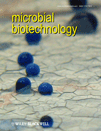
Microbial Biotechnology
Advancing microbial innovation for a sustainable future.Microbial Biotechnology, published by WILEY, stands at the forefront of innovation in the field of applied microbiology and biotechnology, showcasing cutting-edge research and advancements within both academic and industrial contexts. As an Open Access journal since 2012, it ensures that high-quality research is easily accessible to researchers, professionals, and students globally, promoting knowledge sharing and collaboration. With an impressive impact, the journal holds a Q1 ranking in its categories—Applied Microbiology and Biotechnology, Biochemistry, Bioengineering, and Biotechnology—demonstrating its significance in the scientific community. The journal currently boasts a strong Scopus ranking in several relevant disciplines, including a top 10% position in Applied Microbiology and Biotechnology, highlighting its critical role in disseminating influential findings. Designed to foster dialogue and advance technology within the microbial sciences, Microbial Biotechnology is an essential resource for anyone committed to leveraging microbial processes for sustainable and innovative solutions.

WORLD JOURNAL OF MICROBIOLOGY & BIOTECHNOLOGY
Exploring Breakthroughs in Microbial and Biotechnological ResearchWORLD JOURNAL OF MICROBIOLOGY & BIOTECHNOLOGY, published by Springer, serves as a pivotal forum for advancing the fields of microbiology and biotechnology since its inception in 1990. Located in the Netherlands, this esteemed journal has secured a prominent position in the academic landscape, recognized for its strong impact factor and prestigious Q2 category rankings across disciplines such as Applied Microbiology, Biotechnology, and Physiological Sciences. Researchers and professionals utilize this journal to disseminate innovative findings and explore emerging technologies that are transforming the scientific landscape. With a robust submission rate and high visibility among the academic community, the journal fosters interdisciplinary collaboration, encouraging discussions that bridge gaps between theory and practical applications. As it converges into 2024, the WORLD JOURNAL OF MICROBIOLOGY & BIOTECHNOLOGY continues to be a vital resource for scholars aiming to enhance our understanding of microbial processes and biotechnological advances.
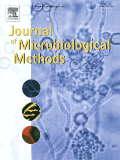
JOURNAL OF MICROBIOLOGICAL METHODS
Empowering research through cutting-edge techniques.JOURNAL OF MICROBIOLOGICAL METHODS, published by Elsevier, is a pivotal platform in the realm of microbiology, covering essential methodologies and innovations from both medical and molecular perspectives. With an ISSN of 0167-7012 and an E-ISSN of 1872-8359, this journal has been a significant contributor to the field since its inception in 1983, with a continued commitment to advancing research through 2024 and beyond. Although classified in the lower quartile (Q3) for both microbiology and molecular biology disciplines, it ranks at #74 in medical microbiology and exhibits a respectable position amidst its peers, marking it as a valuable resource for scholars and practitioners. Researchers, professionals, and students alike will find a wealth of insights and practical methodologies that are vital for contemporary microbiological studies. The journal's emphasis on rigorous peer reviews ensures that the content is both high-quality and relevant, catering to a diverse audience keen on the latest advancements in microbiological practices.

JOURNAL OF MICROBIOLOGY AND BIOTECHNOLOGY
Innovating Knowledge for a Sustainable FutureJOURNAL OF MICROBIOLOGY AND BIOTECHNOLOGY, published by the Korean Society for Microbiology and Biotechnology, is a premier academic journal based in South Korea that has been at the forefront of advancing knowledge in the fields of microbiology, biotechnology, and their applied sciences since its inception in 1991. This journal holds a commendable Q2 quartile ranking in key categories, including Applied Microbiology and Biotechnology, showcasing its significant impact within the academic community. With an emphasis on high-quality, peer-reviewed research, the journal aims to disseminate innovative findings that foster deeper understanding and advancements in microbial and biotechnological sciences. Researchers, professionals, and students utilize this journal to stay informed about contemporary developments and to inspire future investigations. Although it is not an open-access journal, its content is accessible through various academic libraries and databases, providing a vital resource for those engaged in cutting-edge research.

ARCHIVES OF MICROBIOLOGY
Pioneering Insights in Microbiology Since 1974The Archives of Microbiology, published by Springer, is a reputable journal in the field of microbiology, serving as a vital platform for the dissemination of groundbreaking research and critical reviews since its inception in 1974. With an ISSN of 0302-8933 and an E-ISSN of 1432-072X, this journal operates out of Germany and maintains a global reach, promoting high-quality scholarship across multiple disciplines, including biochemistry, genetics, and molecular biology, as evidenced by its Q2 ranking in Medicine (miscellaneous) and consistent Q3 placements in other categories in 2023. Although the journal does not offer open access options, its rigorous peer-review process ensures that published articles are of the highest standard, making it an essential resource for researchers, professionals, and students keen on advancing their understanding of microbial sciences. As the journal converges toward 2024, it remains committed to fostering innovative microbiological research and facilitating interdisciplinary dialogue within the scientific community.

AIMS Microbiology
Championing high-quality research in the realm of microbes.AIMS Microbiology, published by the American Institute of Mathematical Sciences (AIMS), is an esteemed Open Access journal dedicated to advancing the field of microbiology since its inception in 2015. With an ISSN of 2471-1888, the journal aims to disseminate high-quality research and innovative findings pertaining to both fundamental and applied microbiology, encompassing areas such as medical microbiology, immunology, and related life sciences. Recognized for its academic rigor, AIMS Microbiology has achieved a significant standing, evidenced by its current Q2 ranking in both Microbiology and Medical Microbiology categories, along with impressive percentile rankings within prestigious Scopus metrics. Based in the United States, the journal not only emphasizes accessibility and widespread dissemination of knowledge but also plays a crucial role in fostering collaboration among researchers and professionals in the microbiological sciences. By providing a platform for collaborative research and innovative ideas, AIMS Microbiology is poised to influence the future development and application of microbiological research, making it a valuable resource for students, researchers, and practitioners alike.
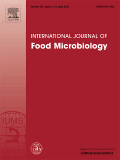
INTERNATIONAL JOURNAL OF FOOD MICROBIOLOGY
Leading Research for a Healthier Food FutureINTERNATIONAL JOURNAL OF FOOD MICROBIOLOGY is a leading journal in the field of food safety and microbiology, published by Elsevier. With an impressive impact factor and a distinguished position, it ranks in the top quartile for both Food Science and Medicine, as well as holding a strong presence in Microbiology and Safety, Risk, Reliability, and Quality categories. The journal provides a vital platform for researchers, professionals, and students to disseminate and discuss innovative research findings and applications that address the complexities of food microbiology. Operating from its headquarters in the Netherlands, this journal not only facilitates access to high-quality scholarly articles but also encourages the development of interdisciplinary approaches to tackle current challenges in food safety and public health. Since its inception in 1984, the journal has continually evolved, ensuring that it remains at the forefront of scientific inquiry, making it a crucial resource for anyone engaged in the food sciences.